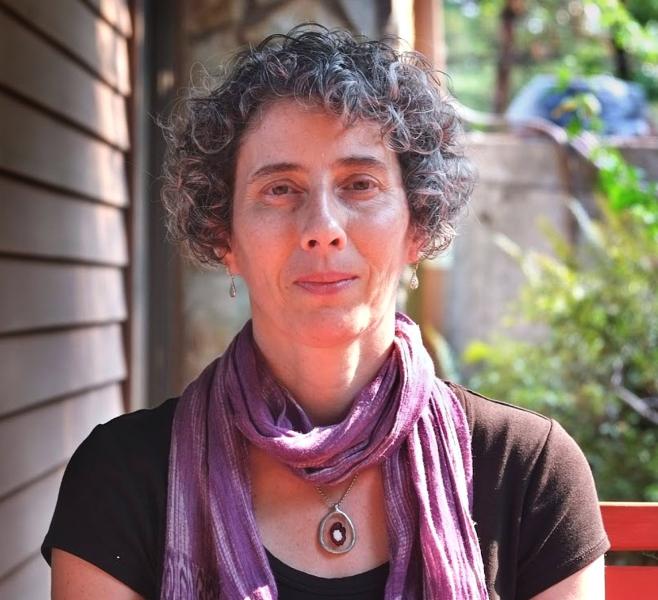Professor DiNitto is accepting graduate students working on modern and contemporary Japanese literature.
Rachel DiNitto is Professor of Japanese Literature working in the environmental humanities with an emphasis on nuclear issues. She researches contemporary cultural production (literature, film, manga), specifically the responses to the triple disaster of March 11, 2011 in Japan. She is working on a new environmental humanties project titled "Combatting Nuclear Amnesia: Environmental Echoes and Nuclear Traces in Japanese Literature" that pairs post-Fukushima fiction with novels and short stories from earlier eras of environmental and nuclear harm. She is the recipient of the 2021 UO Sustainability Award for Excellence in Teaching and was a Sustainability Fellow at UO for 2021-2022 working on essential, invisible nuclear workers.
See below for more of her work on the topic:
Books:
Eco-Disasters in Japanese Cinema, ed. Ann Arbor: Association for Asian Studies/Columbia UP, 2024. The first volume dedicated to a multi-genre analysis of environmental themes in Japanese cinema. The films examined in the 17 chapters cover 1954-2020 and include documentary, monster films, cult films, studio blockbusters, and activist cinema. https://cup.columbia.edu/book/eco-disasters-in-japanese-cinema/9781952636509.
Fukushima Fiction: The Literary Landscape of Japan’s Triple Disaster. Winner of the Choice Magazine Outstanding Academic Title, 2020. https://uhpress.hawaii.edu/title/fukushima-fiction-the-literary-landscape-of-japans-triple-disaster/.
Interviews:
Articles:
“Slow Violence and Japan’s Nuclear Future: Kirino Natsuo’s Baraka.” In Michele Mason and Hester Baer, eds., Nuclear Futures in the Post-Fukushima Age. Palgrave Macmillan, Literatures, Cultures, and the Environment Series, 2024.
“The Toxic Vitality of Kiyoshi Kurosawa’s Charisma.” In Rachel DiNitto, ed., Eco-Disasters in Japanese Cinema. Ann Arbor: Association for Asian Studies/Columbia UP, 2024.
“Chernobyl’s Past and Fukushima’s Remembered Future” In Linda Flores and Barbara Geilhorn, eds., Literature After Fukushima: From Marginalized Voices to Nuclear Futurity. London: Routledge, 2023.
“Writing Human Disaster: Hayashi Kyōko, Ishimure Michiko, and Kawakami Hiromi.” In Rebecca Copeland, ed., Handbook of Modern Women Writers. Japan Documents Publishing, 2022.
“Teaching Disaster—The Fiction of 3/11.” In Alex Bates, ed., Teaching Postwar Japanese Fiction. Modern Language Association Options for Teaching Series, 2022.
“Atomic Metaphors, Victims, and the Contestations of Nuclear Discourse.” Religions. 2021; 12(11):962. Special Issue: Religion and the Atomic Age. https://doi.org/10.3390/rel12110962
「汚染の言説としての「狂気」―チェルノブイリとフクシマにおける汚染のナラティブをめぐって」(Insanity as Toxic Discourse: Narratives of Pollution in Chernobyl and Fukushima). In Saeko Kimura and Ann Bayard-Sakai, eds., 『世界文学としての<震災後文学>』(Postdisaster Fiction as World Literature). Tokyo: Akashi shoten, 2021.
“Envisioning Nuclear Futures: Shiriagari Kotobuki’s Manga from Hope to Despair.” In Roman Rosenbaum, ed., The Representation of Japanese Politics in Manga:The Visual Literacy of Statecraft. London: Routledge, 2021.
“Toxic Interdependencies: 3/11 Cinema.” In Hideaki Fujiki and Alastair Phillips, eds., The Japanese Cinema Book, Chapter 27: Ecology. London: British Film Institute/Bloomsbury, 2020.
Translation of “Same as Always” (Ima made dōri, 2011) by Satō Yūya. In The Penguin Book of Japanese Short Stories edited by Jay Rubin. Penguin Press (2018).
She has also worked on the literary and cultural studies of Japan's prewar (1910s-1930s), and postbubble eras (1990-2000s), including film and manga. In addition to her monograph, Uchida Hyakken: A Critique of Modernity and Militarism in Prewar Japan (2008), and her translations of Hyakken’s fiction, Realm of the Dead, publications include articles on depictions of the Asia-Pacific War in the work of manga artist Maruo Suehiro; Kanehara Hitomi, the young, female writer whose controversial novel Snakes and Earrings won Japan's most prestigious literary award in 2004; and cult director Suzuki Seijun's return to the cinema in the 1980s.
Visit https://uoregon.academia.edu/RachelDiNitto for Professor DiNitto's CV.


